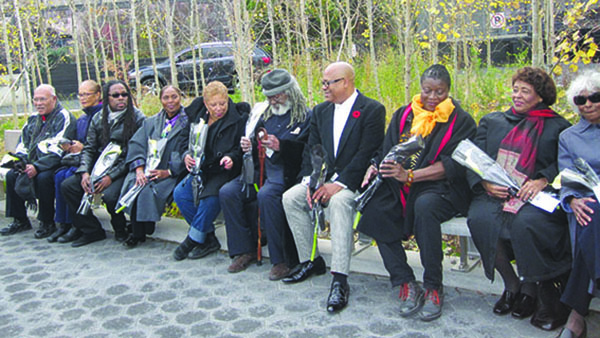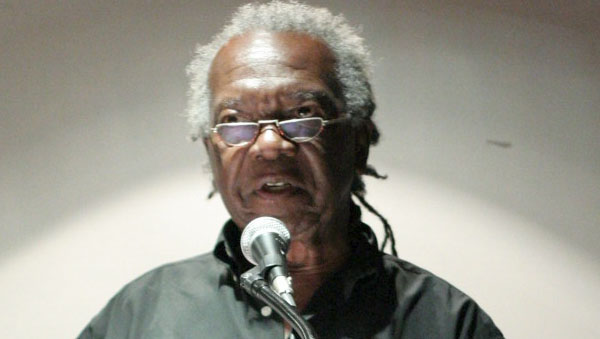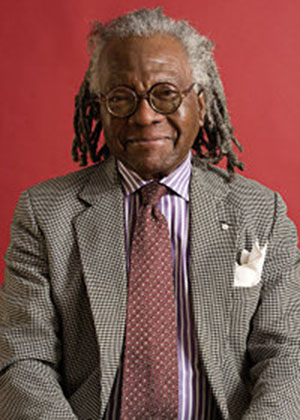By Neil Armstrong
PRIDE Contributing Writer
TORONTO, Ontario — Austin Ardinel Chesterfield (“Tom”) Clarke, 81, a doyen of Canadian literature, is being remembered as a multifaceted, complicated essayist, novelist, short story writer, civil rights activist, former journalist, diplomat, professor and connoisseur who was very generous with his time and who mentored generations of writers.
A bench at Ontario Square at the Harbourfront Centre has this inscription: “A Tribute to Austin Clarke. African-Canadian author and literary pioneer. Dedicated by the Government of Barbados.”
It sits between a bench dedicated to the late Ayanna Black, poet and advocate, and one for Rita Cox, patron of the arts.
Clarke, whose health was ailing for a while, died, last Sunday, in hospital in Toronto.
Born in St. James, Barbados on July 26, 1934 to Kenneth Trotman and Gladys Irene Clarke, he immigrated to Canada in 1955 and attended Trinity College at the University of Toronto, for a short time, before leaving to pursue a career in broadcasting.
His interest in writing began in the 1960s and his stories and novels primarily focused on the plight of the immigrant West Indian in Canada, although his first two novels, The Survivors of the Crossing (1964) and Amongst Thistles and Thorns, (1965) take place in Barbados.
On the day after Clarke’s death, his longtime friend, Rinaldo Walcott, a fellow Barbadian, author and professor at the University of Toronto, said he was feeling profoundly sad.
“But I’m also feeling profoundly grateful that I actually knew him, that we had the kind of relationship that crossed the border of friendship into real family. And that means we had our disagreements and so on but they were never fatal disagreements.”
In remembering his friend, Walcott said what is poignant is the breadth and the depth of Clarke’s contribution.
“Here is a man… publishes his first novel in ’64, the year before Barbados becomes independent. It’s a novel called, The Survivors of the Crossing, which is really a novel about how black people survived in the Americas. By the end of his career he publishes two books, a memoir, ‘Membering, and a novel, More, and in both of them is a profound critique of post-independence, post-colonial, post-civil rights black life. His work spans eras and his work spans genres and his work spans such a deep kind of intellectual history.”
Walcott noted that Clarke was a journalist, something that isn’t spoken about as much as it should be.
The octogenarian produced radio documentaries, including one that featured an interview in 1963 with Malcolm X. Clarke had originally travelled to Harlem to try to interview James Baldwin.
He was a print journalist, and Walcott emphasized that Clarke was the editor at Contrast, a former newspaper serving the black community.
“He was a professor in 1968, right at the founding of Black Studies at Yale, the founding of Black Studies in the Americas, in the USA. If we begin to put all of that together, one sits back and one wonders how could this have not been a life that has been celebrated repeatedly multiple times over and over again.”

Austin Clarke (fifth from right) seen sitting on the newly-unveiled benches in Ontario Square, Harboufront Centre. Others in the photo are, left-right: Vernon Eccles (representing Ayanna Black), Margaret Gittens (representing Charles & Hetty Roach), Earl La Pierre Jr. of Afropan Steelband, Pamela Appelt, Sandra Whiting, George Randolph, Althea Prince, Rita Cox, Kamala-Jean Gopie. Zanana Akande, not seen in the photo, is sitting beside Kamala-Jean Gopie. Organized by A Different Booklist, a local bookstore, in partnership with the Harbourfront Centre, the 12 benches bearing the names of African Canadians were unveiled on November 10, 2014, to honor them for their contributions to African-Canadian History in their various fields. Photo by Neil Armstrong.
Walcott said Clarke was also a man of style and fashion when he had to put on “his monkey suit as he likes to call it, his tux.”
“Many people who know Austin would remember Austin was a man that they saw walking the streets in beautifully-cut coats and so on and so forth.”
He said there is so much more to say about Clarke because, “it was a deep life, a complicated life.”
“In 1977, he ran as a Conservative member and who was his campaign manager – our now mayor. John Tory ran that losing campaign. There’s so much.”
Walcott says if one thinks about what Clarke did from the time he arrived in Canada in 1955 until his exit on June 26, 2016, he was a singular figure.
“The number of people that he mentored. I’m talking about Austin at certain points in his life not even his work is being published and he’s still sitting down and reading people’s work and encouraging them to publish it, and introducing them to people who can publish it.”
As someone who knew the veteran writer personally, Walcott said Clarke “never betrayed a sense of being bitter as we watch writers with less skills gain larger advances, become wealthy – never a moment of bitterness, never a moment of saying that could have been me.”
“He would throw a party for them at his house after the book launch. There was always the after-party after a book launch and it always happened at Austin’s house.”
Clarke, who was honoured with an African Canadian Achievement Award (ACAA) for excellence in the Arts, and was invested with the Order of Canada in 1998, had a profound love for the city and did not live anywhere outside of the core of Toronto – a trait that Walcott shares.
“We joyously loved the before-amalgamation boundaries of Toronto,” said Walcott laughing. “And we watched its recent transformation into condo city and re-whitening sadly and profoundly, because that’s what’s happening. We’re being; black folk are being turfed out of the old boundaries of Toronto.”
Regarding Clarke’s contribution to Canadian literature, Walcott said: “If you think about Austin in relation to Canadian literature, first, we like to talk about our multicultural moment, there are few Canadian novelists who can make the claim that they have impacted two national bodies of literature or two regional literatures. Austin has impacted Caribbean and Barbadian literature and impacted Canadian literature. There are few novelists writing in Canada today who can write dialogue like Austin does. There are few writers writing in Canada today who can give us a sense of the rhythms of the streets of Toronto and other places of Toronto like Austin did.”
He thinks this is an accomplishment that is beyond measure that from Clarke’s second published novel he started writing about the city of Toronto and its rhythms, noises and people “in a deep and profound way before many, many, other well respected and celebrated Canadian novelists can turn themselves to any of Canada’s major cities in the way that he did.”
“They were all still writing about the wilderness and landscape and pretending that they arrived in a place, that we arrived in a place that was unpeopled. Austin turned a sharp inquisitive eye to exactly where he was living, exactly where he was making a life and offered it back to us in a way that hadn’t been done before.”
Itah Sadu, author and owner of A Different Booklist Cultural Centre, and a friend said when she first met Clarke it was it was a moment of meeting a great Caribbean author who was Barbadian.
This was in front of the Parkdale Library attending an event that veteran librarian, Rita Cox, hosted which propelled the development of Black and Caribbean Collection there.
She described Clarke as “a man of fine dining and great art” and she relished in the stories that people told about the fireplace, Clarke swirling a glass of cognac, having the signature pipe in his mouth while discussing all kinds of world literature in a smoking jacket.
These were images she associated with artists like Picasso, James Baldwin or John Keats.
“He became a mentor and I, now as an emerging writer, had to pay attention to the formula and to the methodology and the process of writing. And where I made my departure with him I was concerned about writing for children as opposed to writing for adults. But what I noted was the simplicity of which he told the human story and narrative.”
She said Clarke was a listener and because her job as a storyteller is to listen to the narrative of people to chronicle their information precisely, she took note of his writing.
“In doing so, he also liberated me to understand that I could write in the nation language and also that authors are people that can be accessible and not removed from the everyday working class society.”
She said Clarke paid a price for being accessible, because people often have a greater respect for things that they feel are unattainable as opposed to things that are accessible.
Sadu said he not only inspired Canada but at the same time had the ability to inspire the Caribbean as a region so he was not just a local man but he was an international man, a Commonwealth man and a diasporic man.
She said she would always remember his discipline as a writer to stay up all night but to go back to his home or wherever he was in the world, have a cup of coffee and write again.
“What was particularly interesting of him, he was human and never pretended to be anything else but human. And he was complex and never pretended to be anything else but complex and never apologized for it. Writers comment, they criticize and they compliment and Austin, I think, did all those things.
“He brought the human complicatedness of people, of immigrants, of writers, of artistic people and he brought them in their nakedness, whether they made us comfortable or uncomfortable. And for the nation of Barbados, outside of tourism, sun, sand and sea, flying fish and cou-cou, the only other thing that the world really knows about is really the work of Austin Clarke. And that is something that must be said and the nation has to own that and claim that and do right by him in the same token,” Sadu commented.
Clarke was one of Canada’s foremost authors, whose work includes ten novels, six short-story collections, three memoirs, and two collections of poetry.
“Austin Clarke has participated in the International Festival of Authors numerous times. He was the recipient of the Harbourfront Festival Prize in 2012 and in 2015 we celebrated his body of works with a tribute from fellow literary talents George Elliot Clarke, Lawrence Hill and Dane Swan. Austin Clarke was an important contributor to Canadian letters and an inspiration to the next generation of writers. He will be missed
greatly,” said the International Festival of Authors.
Clarke was the inaugural recipient of The Rogers Communications Writers’ Trust Fiction Prize for his semi-autobiographical novel The Origin of Waves, published in 1997.
He was also the winner of the 1999 W.O. Mitchell prize recognizing his body of work.
His 2002 novel, The Polished Hoe, won the Trillium, Giller and Commonwealth Writers’ prizes.
His novel More was published in 2008 and his memoir, ‘Membering, was published in 2015.
“It was his courage, his fearlessness, and his vision for a more just and inclusive society that made him the first contemporary black Canadian to write Caribbean and black people into the Canadian space, in ways that make it clear such lives matter,” says Hyacinth Simpson, Associate Professor, Department of English, Ryerson University.
“The addition of his voice has certainly made Canadian literature richer and more honest; and now Canada has a vibrant tradition in black writing in large part because Austin broke down the doors of the literary establishment in the 1960s and helped pave the way for other writers over the past few decades,” she added.
Speaking about Clarke’s new memoir, ‘Membering, in November 2015 at an event organized by the International Festival of Authors to honour the writer, author Lawrence Hill said: “The thing that struck me about that particular excerpt, but about the entire book, is Austin sort of breaking the ground — the first major African Canadian and black writer in Canada to achieve national and international acclaim. He didn’t enter the scene quietly and passively.”
In the ‘70s he worked as a cultural attache to the Barbadian Embassy in Washington, and in 1975 returned to Barbados to become general manager of the Caribbean Broadcasting Corp. He returned to Canada in 1976 and ran provincially for the Conservative Party in 1977.
Clarke was a member of the Immigration and Refugee Board from 1983 to 1993 and also held a position with the Ontario Film Review Board from 1984 to 1987.
The veteran author is survived by his four daughters: Janice Clarke, Loretta Clarke, Darcy Ballantyne, and Jordan Clarke; and a son, Michael.
A funeral service is being planned for July 8 at St. James Cathedral in Toronto.
 Pride News Canada's Leader In African Canadian & Caribbean News, Views & Lifestyle
Pride News Canada's Leader In African Canadian & Caribbean News, Views & Lifestyle







An outstanding article, which highlights the most poignant attributes of Clarke and yet one is able to garner an overall picture. Well written.
Thelma Nurse